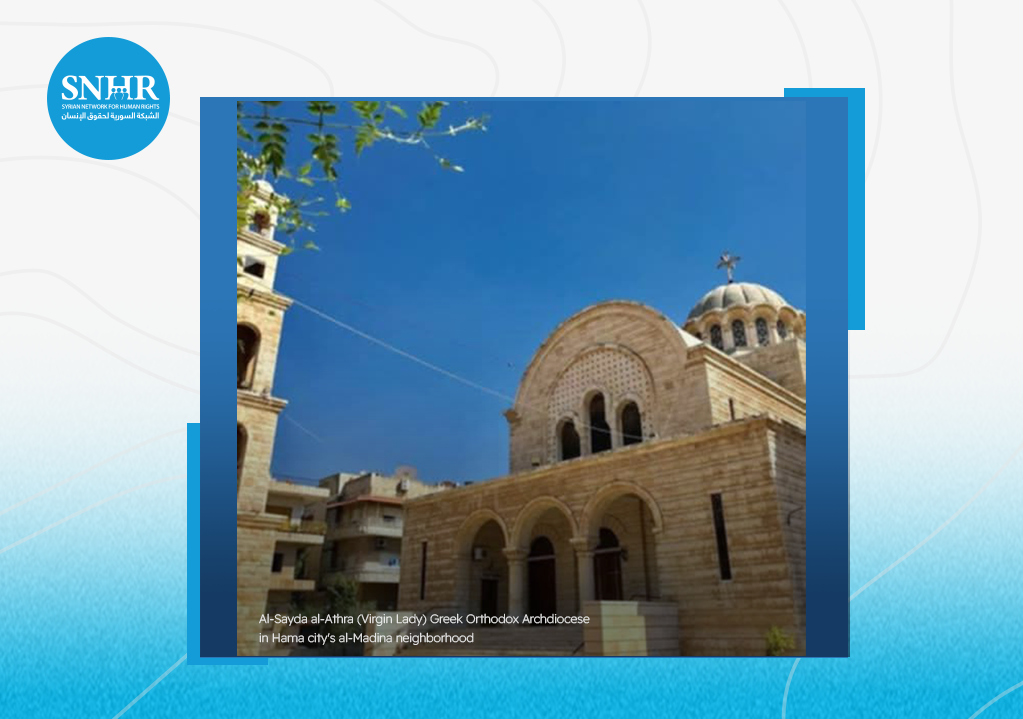
Available In
The Hague – The Syrian Network for Human Rights (SNHR)
On Wednesday, December 18, 2024, Hama’s Greek Orthodox Archdiocese and its subsidiaries, which are located in Hama city’s al-Madina neighborhood, were the target of an armed attack by unidentified armed gunmen. The attackers entered the Archdiocese’s compound and tried to remove the cross there, before opening fire at the church’s walls.
Series of violations in Hama governorate
Since the Military Command Operations took control of Hama governorate on December 5, 2024, the Syrian Network for Human Rights (SNHR) has documented a series of violations which include extrajudicial killings, destroying of homes, and attacks on public and private properties.
Based on the accounts we have gathered from local activists and eyewitnesses, the Ansar al-Tawhid group have been involved in a large percentage of these violations, in addition to other groups that we have not yet been able to accurately identify.
Ansar al-Tawhid (Supporters of Monotheism) is a jihadist group that is active in the Syrian conflict. The group is an offshoot of Jund al-Aqsa (Solders of the Aqsa Mosque) which was dismantled by the armed opposition and Hay’at Tahrir al-Sham (HTS). Ansar al-Tawhid was formed in 2017 by the remaining members of the dissolved Jund al-Aqsa group. Ansar al-Tawhid adopts a Salafi Jihadist ideology under the leadership of a man known as Khaled Khattab.
Importance of protecting religious diversity in Hama governorate
Hama governorate is one of Syria’s most richly diverse governorates, both in religious and ethnic terms, with a mixture that includes Sunni Muslims, Ismailis, Murshidis, Alawites, and Christians. Preserving this diversity and promoting civil peace is a joint responsibility that necessitates the uniting of all parties’ efforts to protect human rights and affirm the values of citizenship.
Responsibility of the controlling powers
Even though the current transitional authorities have followed this incident and the police leadership in Hama governorate have responded to the complaints submitted by the archdiocese, the full responsibility for ending these violations and deterring the perpetrators ultimately falls on the shoulders of the controlling powers, namely the current transitional authorities in Syria.
Blatant violation of international law
SNHR strongly condemns this attack that targeted Hama’s Greek Orthodox Archdiocese and its subsidiaries. We must stress that the targeting of places of worship and religious symbols is a blatant violation of:
International human rights law, particularly Article 18 of the International Covenant on Civil and Political Rights (ICCPR) that guarantees the right to freedom of religion, including the right to practice religion, and the construction and preservation of places of worship. The ICCPR obliges states to protect places of worship in order to protect the rights of individuals to practice and observe their religion peacefully.
United Nations General Assembly resolution 75/258 on “Promoting a culture of peace and tolerance to safeguard religious sites”, which urges states to adopt tangible measures to protect them.
Recommendations by SNHR
- Obligations of the current transitional authorities
- The current transitional authorities must fulfill their legal and ethical obligations in accordance with national laws and international human rights standards. This includes ensuring the protection of civilians and their properties, conducting serious investigations into the incident in question, as well as other similar violations, and holding all those responsible accountable through fair and transparent judicial procedures.
- Authorities are required to take tangible preventive measures to ensure non-recurrence, including strengthening their security presence at sensitive religious and cultural sites.
- Enhancing documentation and accountability mechanisms
- SNHR calls on citizens to cooperate with local and international human rights entities by reporting any observed violations while ensuring the protection of witnesses and reporters.
- Involve the local community in finding solutions:
- Community awareness: Programs and awareness campaigns should be launched to promote the principles of peaceful coexistence and mutual respect among communities, with a focus on combating extremist ideologies that threaten civil peace. These programs can be implemented in collaboration with religious leaders and civil society organizations.
- Diversity protection initiatives: SNHR calls for the formation of community committees comprising representatives from all ethnic and religious groups in the area. These committees should coordinate with the current transitional authorities to protect sites of religious and cultural significance and ensure respect for social diversity.


